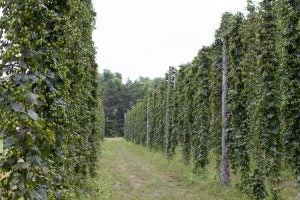Eric Sannerud and Ben Boo didn’t grow up on a farm, but they knew they had a thirst for it.
“We’re the new batch of farmers that didn’t quite manage to grow up on a farm, but found themselves in the business anyway,” Sannerud said.
The hops business that is — and they are doing well. The friends and founders of Mighty Axe Hops near St. Cloud, Minnesota, recently announced they will be expanding from 43 acres to 80 next spring, making it the largest hops farm in the state.
One of 17 new farmers selected for the 2016/2017 National Farmers Union’s Beginning Farmer Institute class, Sannerud doesn’t pretend to be an expert in hops farming. The University of Minnesota graduate holds a degree in sustainability, business, and social justice. It was during these formative years at UMN that Sannerud met Boo, a horticulture major.
“We were both quite interested in some sort of farming,” Sannerud said . “We were inspired by some things we had learned in class and thought that would be a great way to earn a living eventually.”
After driving back from a sustainable agriculture conference in Wisconsin, the two came up with the plan to grow hops. A couple of weeks before graduation, they planted their first 20 hop plants.
“It was really very little that would fit into almost anyone’s backyard,” Sannerud said. “The first 20, we were able to give that to a brewer. That vote of confidence and that brewer brewing with our hops really allowed us to take the little steps from there.”
Since then growing hops has been a learning game for the two young entrepreneurs. Mighty Axe uses its Ham Lake location to trial run different hop varieties before planting them full scale. Its plant portfolio now includes Cascade, Crystal, Centennial, and CTZ.
“Honestly I still say that we don’t really know what we are doing. No one knows how many pounds of hops you expect to produce on an acre in Minnesota or North Dakota or Wisconsin. That data is not there. There’s not the history of the crop and the history of tip top production practices and experienced farmers,” Sannerud said. “While I do think over the last four years, we have developed a much better understanding of how to grow hops in Minnesota and I think our plants have looked the best this year as they ever have.”

Courtesy of Mighty Axe
The Pacific Northwest states of Oregon, Washington, and Idaho’s panhandle grow 97.8 percent of the hops in the United States, according to Hop Growers of America. Total U.S. hop acreage grew by almost 20 percent to more than 53,000 acres this year, and demand continues to grow as more and more craft brewers spring up across the U.S.
Over the course of four years Mighty Axe has sold to quite a few local breweries, including regular clientele such as Fair State, Bad Weather, and Fulton brewing companies.
The price of hops can vary widely based on variety and local demand. According to a recent Associated Press article, the average price of U.S. hops rose from $3.67 to $4.38 per pound last year.
“I can’t tell you how much I’m going to be able to sell 80 acres of hops for. People would be surprised how many of those varying underlying tenets, not just in our farm production but in the industry if you will, are unknown. And so I think that what we are doing here is extremely risky, but it is also something we believe in a lot,” Sannerud said. “We believe in the value of local sourcing and to bring that opportunity into something we love as much as beer, we had to do it.”
Mighty Axe also believes in helping the hops industry grow throughout the Midwest. Its six-page Growers Guide, which details the pair’s experiences with growing hops in a Northern climate, has been downloaded nearly 1,500 times. The business also fields many questions through emails, and the two host regular farm tours.
“One of the things we really believe in is this industry is much larger than Mighty Axe,” Sanderud said. “Michigan has 2,000 acres of hops, and sure they produce more beer than the rest of us combined, but there is no reason we can’t have a similarly robust industry. And I fully expect other growers to come in, and I hope that the industry has space for growers of all sizes to continue to meet their individual goals.”
Sannerud also throws out caution … hop farming isn’t for everyone.
“I think hops are a super interesting crop, and people, who are maybe considering growing them, should spend a lot more time thinking and planning about growing them before throwing them in the ground. It’s a long game growing hops,” Sannerud said. “Start very small, risk the least you can. If you can run an acre real well, and you like, it and it works in your soil and in your system, then you can start thinking about something more at a production scale.”



